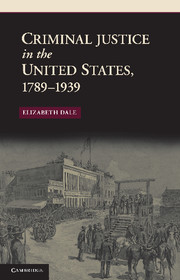Book contents
- Frontmatter
- Contents
- Introduction
- 1 criminal justice and the nation, 1789–1860
- 2 crime and justice in the states, 1789–1839
- 3 law versus justice in the states, 1840–1865
- 4 states and nation, 1860–1900
- 5 criminal justice, 1900–1936
- 6 rights and the turn to law, 1937–1939
- Conclusion
- Bibliographic Essay
- Index
- References
1 - criminal justice and the nation, 1789–1860
Published online by Cambridge University Press: 05 June 2012
- Frontmatter
- Contents
- Introduction
- 1 criminal justice and the nation, 1789–1860
- 2 crime and justice in the states, 1789–1839
- 3 law versus justice in the states, 1840–1865
- 4 states and nation, 1860–1900
- 5 criminal justice, 1900–1936
- 6 rights and the turn to law, 1937–1939
- Conclusion
- Bibliographic Essay
- Index
- References
Summary
Histories of criminal justice in the West are typically accounts of the rise of the State, specifically the nation-state. Those studies trace the way central governments consolidated control over the institutions of criminal justice, a process that allowed legal processes to be standardized, helped guarantee the rule of law and fundamental fairness, and ensured social stability and order. More to the point, because “the criminal justice process [was] the most explicit coercive apparatus of the state,” that process gave the nation-state the monopoly on violence that modern theories of sovereignty assume.
The United States is the exception that proves that rule. Across the nineteenth century, while other Western nation-states centralized their control over criminal justice, the United States did not. Although there is general agreement on that point, there is no consensus about why the United States resisted the Western trend. According to some, it was a product of constitutional imperative: the U.S. Constitution reserved police powers – the authority to protect and regulate the health, safety, and welfare of the people – for the governments of the various states; since criminal justice fell squarely within the scope of the police power, constitutional theory required congressional inaction.
- Type
- Chapter
- Information
- Criminal Justice in the United States, 1789–1939 , pp. 6 - 20Publisher: Cambridge University PressPrint publication year: 2011

